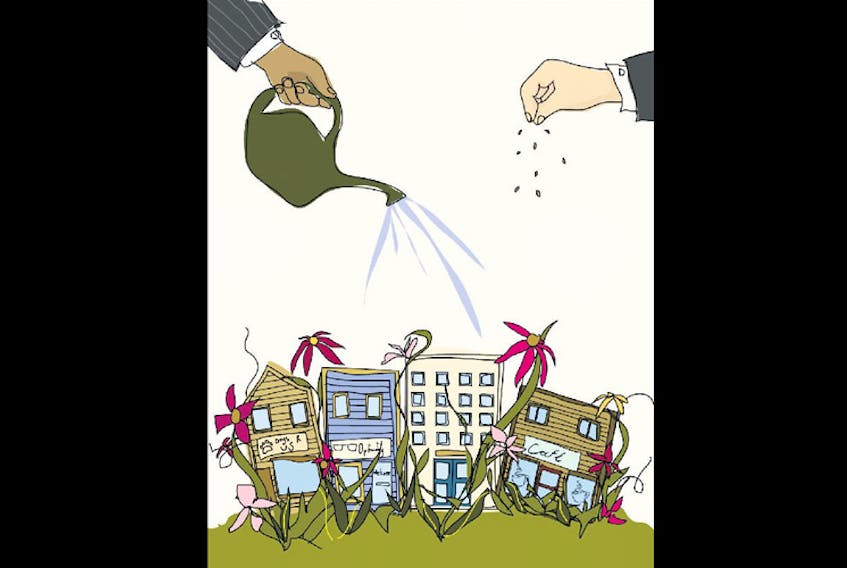Jeff Kelly thinks of social enterprise as capitalism with a social purpose.
As executive director of The Flower Cart Group, a New Minas-based conglomerate of social enterprises providing employment training opportunities to adults with intellectual disabilities, he witnesses the gap between different communities being bridged every day through his work.
“Our social enterprises provide further community inclusion,” said Kelly.
Walls are being broken down when customers buy a loaf of bread from Baker’s Choice Fine Foods, a bakery run by The Flower Cart Group, and talk to the professional people serving them, said Kelly. And it’s the same when employees at Michelin North America work alongside some of the more than 40 clients from the Flower Cart.
“It allows people to interact with someone who they might never have interacted with before,” he said. “It hopefully chips away barriers.”
For 20 years, The Flower Cart Group has worked in partnership with Michelin in the Valley. Its $1-million contracted labour services agreement with Michelin currently provides 42 Flower Cart clients with paid employment at the plant. They do everything from sharpening knives and scissors to cleaning machines and collecting and sorting rubber wastage.
The Flower Group is not alone. In Nova Scotia there are an estimated 3,140 social enterprises and the number is growing.
“We’re heading in the right direction,” said David Upton, co-founder of Halifax-based Common Good Solutions, and a founding member of the Social Enterprise Network of Nova Scotia.
While other countries, such as Scotland, have more fully embraced social enterprise, in Nova Scotia it is seen as an emerging sector with the potential to strengthen communities, create jobs, and engage young people, while at the same time growing entrepreneurship. What makes social enterprises a bit different is that they operate to address social, cultural, environmental or economic challenges, with most profits or surpluses reinvested to support those purposes.
“What we’re trying to do is model a better type of behaviour from businesses,” said Upton.
“I think there is a growing consumer belief that businesses need to do more.”
Common Good Solutions and the Social Enterprise Network of Nova Scotia are working hard to create a culture shift and help entrepreneurs take the leap to doing business differently. Cathy Deagle-Gammon points to the network’s website as a great starting point for those interested in social entrepreneurism.
“There is a wealth of resources and information available and a map of Nova Scotia with social enterprises … find one in your area of interest or location and learn more,” said Deagle-Gammon, president of the non-profit society that is not only working to build a movement in the province but is advocating on behalf of social entrepreneurs and businesses.
Common Good Solutions recently funded a documentary called The Social Shift seeing it as a way to inspire more young entrepreneurs to use social enterprise as a viable option to make the province a more sustainable and inclusive place. The documentary screened at the recent Atlantic International Film Festival.
“There is a desire among many young budding entrepreneurs to engage in the ‘social shift’ away from traditional capitalism to more purpose-driven businesses – this is what social enterprise can provide,” said Kelly.
Through social enterprise, young entrepreneurs need to know that “they have an opportunity to really make a social impact in a community,” he added.
But more needs to be done to make it possible for increasing numbers of people to dive into social entrepreneurism. Access to capital is currently extremely difficult, said Upton. He is pushing the provincial and federal governments to create a dedicated investment fund supportive of social enterprises.
For Kelly, knowing that he is part of a business focused not just on profits, but on empowering people to challenge themselves, learn new skills, and exercise their right to meaningful, challenging employment, makes getting up to go to work easy.
“Every day you see the smiles and the laughter here.”
Social enterprise
- Nova Scotia social enterprises generated at least $127 million through the sale of goods and services in 2013
- More than 71 per cent of N.S. social enterprises are operated at the scale of a neighbourhood or local community.
- Social enterprises provide paid employment for at least 5,630 people. That’s more than $83 million in wages and salaries.
- $179,000,000 in revenue, $123,000,000 in total sales and $28,000,000 in net profits and surplus revenues.
Source: Social Enterprise Framework, Mapping the Social Shift: Nova Scotia's Social Enterprise Sector Survey Report 2017 (https://senns.ca/wp-content/uploads/2018/02/Survey-Report-WEB.pdf Page 37)









